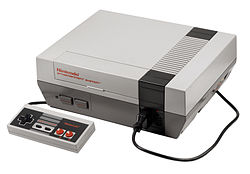- Retrogaming
-
 Example of a retrogaming console, the Nintendo Entertainment System, released in 1985
Example of a retrogaming console, the Nintendo Entertainment System, released in 1985
Retrogaming, also known as old-school gaming, is the hobby of playing and collecting older computer, video, and arcade games. These games are played either on the original hardware, on modern hardware via emulation, or on modern hardware via ports or compilations. Participants in the hobby are sometimes known as retrogamers in the United Kingdom, while the terms classic gamers, or old-school gamers are more prevalent in the United States. Similarly, the games are known as retrogames, classic games, or old-school games. Retrogaming is often linked to, although not the same as, indie gaming (the hobby of playing games that are not published by any conventional publisher).[1] Additionally, the term old-school could apply to a newer game, but with features similar to those of older games, such as "old-school RPGs".
Contents
Games
Among the most popular retro games are those produced around the 1980s[citation needed] and 1990s, and include video games for consoles such as the Atari 2600, Nintendo Entertainment System, Sega Master System, Mega Drive, Super NES, PlayStation, and Nintendo 64, as well as personal computer games for the Commodore 64, MSX, ZX81, ZX Spectrum, Amstrad CPC, Commodore Amiga, NEC PC-88, PC-98, Sharp X1, Sharp X68000, FM-7 and DOS platforms. Arcade games are also popular, especially early games by Konami, Sega, Atari, Taito, Williams Electronics, Namco, Nintendo, Technos, Capcom, and SNK. Games in this era were frequently attributed to individual programmers, and many retro gamers seek out games by particular developers, such as Tomohiro Nishikado, Shigeru Miyamoto, Shigesato Itoi, Bill Williams, Eugene Jarvis, Dave Theurer, Nasir Gebelli, Jeff Minter, Yuji Horii, Yu Suzuki, Tony Crowther, Andrew Braybrook, Hideo Kojima, and Hironobu Sakaguchi. Some games are played on the original hardware; others are played through emulation, and in some cases entirely new versions of the games are written (so-called "retro remakes"). As well as playing games, a subculture of retrogaming has grown up around the music in retro games.
Modern retro
In the wake of increasing nostalgia and the success of retro-compilations in the sixth and seventh generations of consoles, retrogaming has become a motif in modern games, as well. Modern Retro games will impose limitations on color palette, resolution, and memory well below the actual limits of the hardware in order to mimic the look of older hardware. These may be based on a general concept of retro, as with Cave Story, or an attempt to imitate a specific piece of hardware (as with La Mulana and its MSX color palette).
Modern retrogaming began to gain traction thanks in part to the independent gaming scene, where the short development time was attractive and commercial viability was not a concern. More recently major publishers have started to embrace modern retro with releases like Mega Man 9 (an attempt to ape NES hardware), Retro Game Challenge (a compilation of new games on faux-NES hardware), and Sega's Fantasy Zone II remake, which actually used emulated System 16 hardware running on PlayStation 2 to create a 16-bit reimagining of the 8-bit original.
Modern retro may sometimes be more broadly applied to games that feature retro-style designs with more modern graphics, like Pac-Man: Championship Edition, Space Invaders Extreme, or 3D Dot Game Heroes.
The nostalgia-based revival of older game styles has also been accompanied by the development of the modern chiptune genre of game music. Chiptunes are characterized by severe limitations of sound imposed by the author's self-restriction to using only the original sound chips from 8-bit or 16-bit games. These compositions feature in many retro-style modern games and are popular in the demoscene.
Retrogaming Culture
With the hobby of collecting older video games comes a culture that includes magazines like Retro Gamer[2], online newsletters like Retrogaming Times Monthly[3], websites like Racketboy[4], podcasts such as RetroGaming Roundup[5], and expos, like Classic Gaming Expo[6], in addition to numerous videos, songs, forums, etc.
See also
- Retrocomputing
- Abandonware
- Atari Flashback (plug-and-play system)
- C64 Direct-to-TV
- Capcom Classics Collection (compilation)
- Console emulator
- DOS
- Windows 1.0
- Mac OS (1-9)
- History of video game consoles (first generation)
- Virtual Console
- 3DS Virtual Console
- MAME (arcade emulation)
- Midway Arcade Treasures (compilation)
- Namco Museum (compilation)
- Power Player Super Joy III
- Hipster (contemporary subculture)
References
- ^ "NES Classics: retro gaming, at a price: Page 1". arstechnica.com. http://arstechnica.com/articles/columns/game/gars-07142004.ars. Retrieved 2008-04-14.
- ^ http://www.retrogamer.net/
- ^ http://retrogamingtimes.com/
- ^ http://www.racketboy.com/
- ^ http://www.retrogamingroundup.com/
- ^ http://www.cgexpo.com/
External links
Categories:- Retrocomputing
- Video game culture
- Arcade games
Wikimedia Foundation. 2010.
